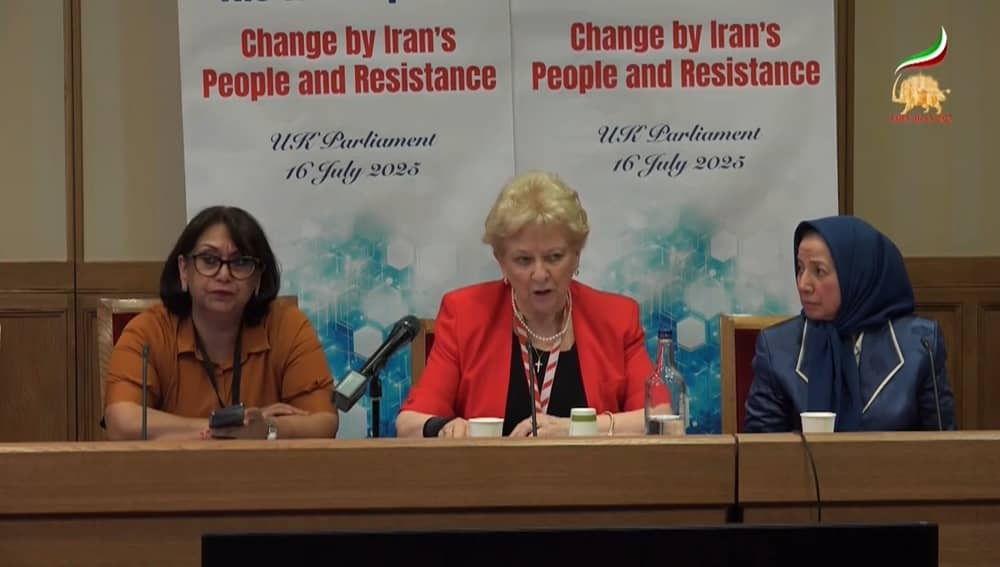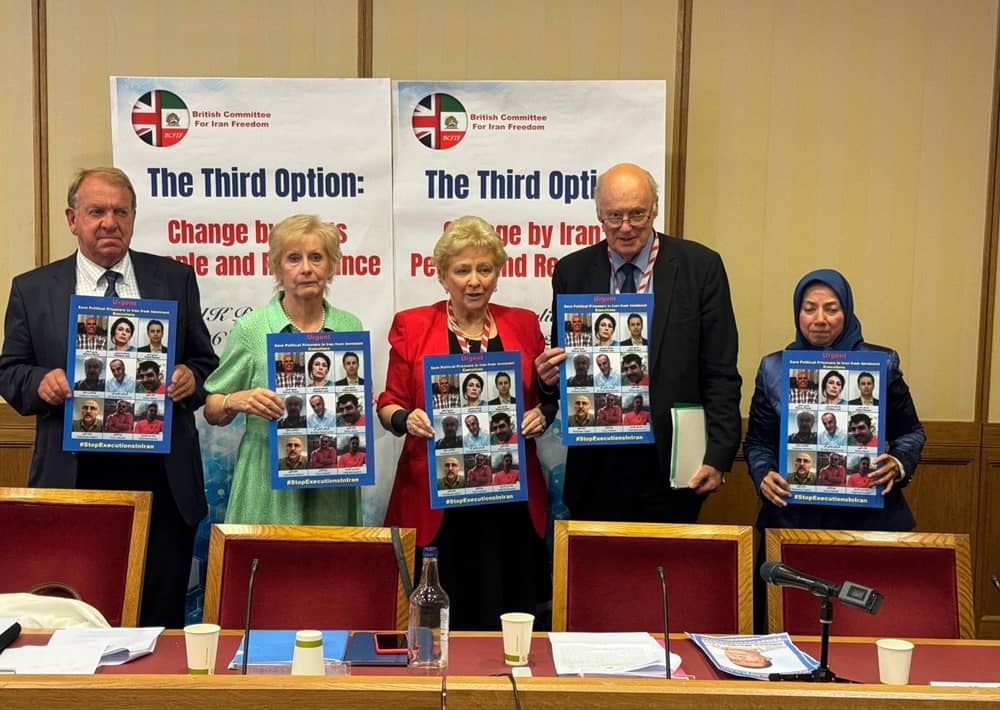Facebook
Twitter
LinkedIn
Pinterest
Reddit
Email
Print
 Baroness O’Loan addresses UK Parliament meeting on July 16, 2025
Baroness O’Loan addresses UK Parliament meeting on July 16, 2025
At a cross‑party conference in the UK Parliament on July 16, 2025, Baroness Nuala O’Loan—chair of the British Committee for Iran Freedom—warned that Tehran’s clerical regime is closer than ever to triggering a regional war and exporting repression to British soil. Flanked by MPs, Peers, legal experts, and human‑rights advocates, she argued that Western policy has been trapped between two bankrupt extremes: military intervention and diplomatic appeasement.
Instead, Baroness O’Loan urged the Government to engage directly with the National Council of Resistance of Iran (NCRI) and its President‑elect Maryam Rajavi, whose “Third Option” calls for regime change by the Iranian people and their organized resistance. She welcomed sanctions already imposed on the Islamic Revolutionary Guard Corps (IRGC) but pressed ministers to outlaw the IRGC fully, implement Jonathan Hall KC’s recommendations on proscribing state‑backed terror entities, and warn Tehran that any attack on dissidents in Britain will provoke severe consequences.
Reading a message from Mrs. Rajavi, Baroness O’Loan relayed fresh details of death sentences and torture used to crush dissent inside Iran and condemned attempts—some orchestrated by Tehran—to rehabilitate the Shah’s remnants. Mrs. Rajavi’s appeal called for a parliamentary resolution recognizing the Iranian people’s right to overthrow the regime, triggering UN “snapback” sanctions, and conditioning all UK ties on an immediate halt to executions.
Baroness O’Loan closed by affirming that a non‑nuclear, democratic republic in Iran “serves both our security and our values,” noting that more than 600 British legislators back Maryam Rajavi’s Ten‑Point Plan.
Full text of Baroness O’Loan’s opening remarks and Maryam Rajavi’s message
(lightly edited for clarity and flow):
#UK Parliamentarians Champion ‘Third Option’ for #Iran, Rejecting War and Appeasementhttps://t.co/INZfBcU61N
— NCRI-FAC (@iran_policy) July 19, 2025
Baroness O’Loan (Chair)
We meet tonight under the banner “The Third Option: Regime Change by Iran’s People and Resistance,” hosted by the British Committee for Iran Freedom. Our discussion is both timely and urgent: Iran and the wider region stand at a critical juncture.
The recent 12‑day conflict between the Iranian regime and Israel brought the Middle East perilously close to a wider war. Domestically, the regime has exploited that crisis to tighten its grip—arresting protesters, targeting dissidents and their families, and subjecting women to arbitrary detention and harassment. Repression is a sign of fear, not strength—fear of the people and their democratic aspirations.
For too long Western policy has oscillated between two failed approaches: military intervention and diplomatic appeasement. The Iranian Resistance, led by the NCRI and Madam Rajavi, offers a principled third course: regime change by the Iranian people and their organized resistance. We are honored to welcome Ms. Dowlat Nowruzi, the NCRI’s UK representative, who will elaborate on that path.
Our meeting also follows the Intelligence and Security Committee’s new report confirming Tehran’s growing threat to Britain through espionage, assassination plots, and harassment of dissidents and journalists. The report chastises successive governments for fixating on the nuclear file while neglecting broader strategy. I welcome sanctions covering the entire IRGC and the decision to place Iran, its intelligence ministry, and the IRGC in the higher tier of the Foreign Influence Registration Scheme—but more must be done.
The regime poses a persistent, wide‑ranging threat. I look forward to supporting legislation that implements Jonathan Hall KC’s recommendation for proscription‑style powers to outlaw state‑backed terrorist entities such as the IRGC. Above all, the Government must make clear to Tehran that exporting repression to UK soil will carry serious consequences.
I urge ministers to engage officially with the NCRI and to invite Madam Rajavi to Parliament. Her insight into the regime—and her leadership in the struggle for a free Iran—are invaluable in shaping effective policy on terrorism, regional security, and the nuclear issue. A democratic republic in Iran serves both our security and our values, and more than 600 MPs and Peers have signed letters supporting Rajavi’s Ten‑Point Plan.
Allow me now to read Madam Rajavi’s message to this meeting.
Message to the Conference at the UK Parliament, “Third Option: Change by Iran’s People and Resistance”
The real war is between the people of Iran and the ruling religious fascism
The twelve-day war has brought to light an undeniable truth: the solution to the crisis in Iran lies… pic.twitter.com/xHXrDx5TEf
— Maryam Rajavi (@Maryam_Rajavi) July 16, 2025
Message from Maryam Rajavi, President‑elect of the NCRI
“The 12‑day war laid bare an undeniable truth: the solution to Iran’s crisis lies neither in appeasing the regime nor in foreign military intervention. The real path forward is the Third Option—regime change by the Iranian people and their organized resistance.
Since Khamenei escalated regional warmongering two years ago, his primary aim has been to block uprisings inside Iran. Immediately after the recent war, he launched a new wave of repression. A fresh law rushed through the regime’s parliament accelerates executions. On 12th of July, the judiciary—the regime’s machinery of death—sentenced three political prisoners, Farshad Etemadi‑Far, Masoud Jamei, and Alireza Mardasi (Hamidavi), to death for alleged PMOI membership; two others received 27 years in prison. The Supreme Court has now upheld death sentences against two more defendants for the fourth time.
These rulings expose two facts: first, Khamenei’s greatest fear is a society seething with anger and ready to rise; second, by imposing death solely for PMOI membership, he admits where the real threat—and the democratic alternative—lie.
I commend the UK’s Intelligence and Security Committee for exposing yet another facet of the regime’s criminal behaviour, this time its terrorist plots in Britain. The mullahs have never been so vulnerable or powerless in the face of the Iranian people’s determination for freedom.
Meanwhile, certain media and political circles attempt—through shallow propaganda—to rehabilitate remnants of the Shah’s dictatorship. No one benefits more than the current regime, and many such campaigns are orchestrated or amplified by Tehran itself. Any action prolonging clerical rule must be rejected.
A 40‑year policy that has fueled insecurity, terrorism, and warmongering must end. The world should instead embrace the values in the joint statement signed by a majority of both Houses: support for a non‑nuclear, democratic Iran founded on separation of religion and state, gender equality, abolition of the death penalty, and autonomy for all ethnic groups.
I respectfully urge UK parliamentarians to introduce a resolution that
• recognizes the Iranian people’s struggle to overthrow the regime and the PMOI’s legitimacy in confronting the IRGC;
• triggers the UN ‘snapback’ mechanism under Resolution 2231 to re‑impose sanctions on Iran’s nuclear projects;
• designates the ruling regime as a clear and imminent threat to international peace and security under Chapter VII of the UN Charter; and
• conditions all diplomatic and economic relations on the immediate cessation of executions in Iran.”
